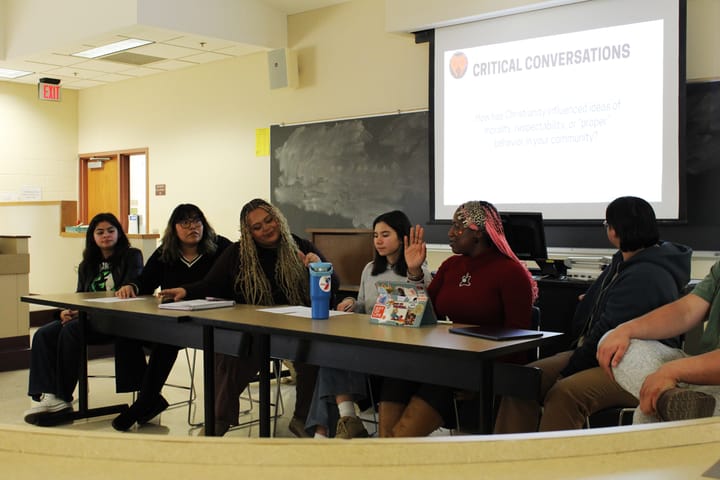Graduate researcher highlights flaws in grading

Most — if not all — students have come face to face with receiving a grade they were unhappy with. But when a student fails a test or paper, does that push them to do better next time, or does it actually inhibit them from succeeding?
This question was the basis for Sam Macdonald’s talk on the evening of Nov. 6. Macdonald, a National Science Foundation’s graduate research fellow from the University of Nebraska-Lincoln, came to Augustana to discuss traditional grading practices and possible steps toward building a more supportive and equitable system.
Senior Lin-Lin Elliott, a chemistry, math, statistics and Spanish quadruple major, expressed that this was one of the best talks that she has ever attended at Augustana.
“The speaker was so enthusiastic about the topic that he’s delivering, and the topic itself is so important for students to understand exactly how grading works,” Elliott said. “I really think that this topic should be more advertised.”
Junior Hiwote Hailu, who is the current math club president, believed that Macdonald’s talk had the potential to resonate with students from all types of majors.
“I think this talk helps students feel seen and understood, especially those who may struggle with grades or motivation,” Hailu said.
Part of Macdonald’s talk focused on how retaking or correcting exams for a better grade is beneficial for students so they can actually learn the information they didn’t understand the first time. If a student earns an F on an exam and moves on without comprehending what they did wrong, then they didn’t learn from that exam.
Elliott loved the idea of exam retakes.
“I think it’s so essential — not even just retaking an exam but doing corrections on the exam because you can see ‘Oh, I did this wrong,’” she said. “Then when the professor asks you to correct it, then you can figure out, ‘How do I correct it?’”
Another point that Macdonald honed in on was how failing one exam can disproportionately affect a student’s grade.
He brought up an example where a student might have received As on the first two exams in the class, but on the day of the third exam, they were extra stressed or just having a bad day, so they failed the third exam, causing their overall grade to fall.
Macdonald connected this example back to the idea that professors should allow students to retake exams, thus allowing them a second chance after one sub-par performance.
“If you have a bad day or if you just can’t come to class, it’s really important for professors to not take that against you,” Elliott said.
Macdonald also discussed how traditional letter grades aren’t valid reflections of a student’s ability in a course. He suggested switching to other grading practices, such as the minimum grading system, in which students cannot earn below a certain percentage on any assignment or exam.
Hailu agreed with Macdonald that traditional grading systems don’t accurately reflect student ability.
“They only measure one dimension of a student’s performance,” she said. “Grades often depend on test-taking skills or external factors like stress or sleep deprivation.”
Macdonald believes that it is the responsibility of the educator to fairly grade their students, but a major issue with grading is that teachers must put aside their biases and try to be as objective as possible.
Sydney Rogers, a senior secondary education and math student, believes that subjectivity is inevitable in grading. She thinks that its effect can be minimized by using a rubric or an anonymous grading system, but it varies from subject to subject.
“I feel like in math it’s a little easier to be less subjective because at the middle and secondary level there will be a right answer,” Rogers said.
As a future teacher, Rogers is on the fence on what she exactly wants to do regarding grading.
“In my own classroom, I think I hope to grade homework on completion, and not on accuracy, to help iterate how important it is to get the practice but not to punish students while they are still figuring it out,” Rogers said.



